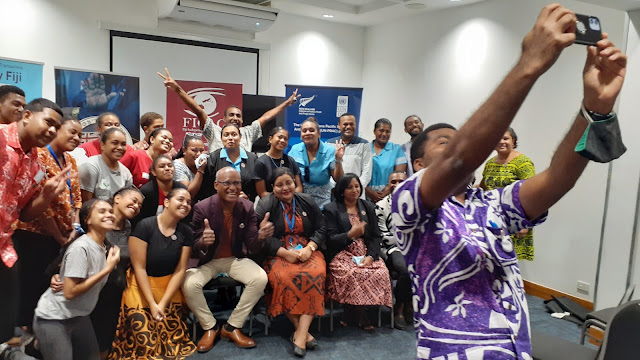Pacific governments urged to engage civil society to boost anti-corruption efforts
Joseph Veramu is Executive Director of CLCT Integrity Fiji – Transparency International’s
National Contact in Fiji.
When Shakespeare wrote in his famous play Macbeth that
“Something is rotten in the state of Denmark", he could not possibly be
meaning Denmark which was ranked first in the Corruption Perceptions Index 2021
– which measures perceived levels of public sector corruption by experts and
the business community. While Denmark may have its own challenges too,
Shakespeare who is studied widely in high schools in Melanesian nations was
probably alluding to nations like Fiji, PNG, Solomon Islands and Vanuatu where
curbing public sector corruption is challenging. All is not well at the top of
the political hierarchy in Melanesia. CSOs in the anti-corruption space can
sometimes feel like Hamlet – sleep walking through anti-corruption advocacy as
the ‘rank and gross’ spirits of corruption refuse to be curbed!
Amongst the 180
countries assessed globally, Fiji had a score of 55 out of 100 – 100 indicating
very clean and 0 very corrupt. Vanuatu, Solomon Islands and Papua New Guinea
stagnated with scores 45, 43 and 31 respectively.
Melanesian governments are working proactively on developing anti-corruption strategies.
Can
more be done to curb corruption and improve CPI scores?
The Global
Corruption Barometer Pacific 2021 Survey – measuring public perceptions of
corruption, results for Fiji noted that “68% of citizens think that corruption
in government is a very big problem. The report also noted that the Solomon
Islands and Papua New Guinea had the highest percentages (in comparison to
other Pacific nations) of public perceptions that corruption in government is a
very big problem, at 97 and 96 percent respectively. In Vanuatu, the percentage
of people who think that corruption is a very big problem in Government was
73%.
In most Melanesian nations, there are policies in place
under the provisions of UNCAC, SDG 16 and UNGASS to tackle corruption. Our
experiences indicate that sometimes these well-meaning policies are not
effectively translated into tangible actions in the annual plans of Ministries
tasked with promoting transparency and accountability.
Integrity Fiji has found that working with the Ministry
involved in Government procurements has helped to ensure that vendors and
suppliers are familiar with ethical compliance procedures. The Fijian NGO also
found that working closely with UN agencies like UNDP and UNODC has been very
helpful in providing best practices on anti-corruption strategies under the
provisions of UNCAC. In the case of UNODC Pacific, they have excellent
procurement resources and expertise to assist Government procurement officers
develop proactive competency skills in ethical processes.
It is also noted that there is sometimes a tendency to
personalize culture. Tribal or kinship links are sometimes exploited by people
in powerful positions for personal gain. This calls for governments to ensure
greater transparency and accountability to citizens in their dealings.
Alluding to the
Transparency International recommendations that accompanied the CPI 2021 global
release, Melanesian governments should ensure adequate and meaningful
consultations with non-state agencies to;
(a) Uphold the rights needed to hold power to
account. Governments should roll back any disproportionate restrictions on
freedoms of expression, association and assembly introduced since the onset of
the pandemic.
(b) Restore and strengthen institutional checks
on power. Public oversight bodies such as anti-corruption agencies and supreme
audit institutions need to be independent, well-resourced and empowered to
detect and sanction wrongdoing.
(c) Combat transnational forms of corruption.
Governments in advanced economies need to fix the systemic weaknesses that
allow cross-border corruption to go undetected or unsanctioned.
(d) Uphold the right to information in government
spending. As part of their COVID-19 recovery efforts, governments must make
good on their pledge contained in the June 2021 UNGASS political declaration to
include anti-corruption safeguards in public procurement.
Pacific governments now have the latest baselines from the CPI 2021 to develop effective strategies for tackling corruption. This calls for evaluating various activities in national anti-corruption plans. It may mean that “same old-same old’ activities where workshops are held in poverty-stricken villages, and long lectures in air-conditioned hotel settings are evaluated for their effectiveness. Governments in the anti-corruption space should be actively monitoring and evaluating every activity they run to combat corruption. More action-based research should be undertaken to improve the strategies being used by governments to combat corruption.



Comments
Post a Comment